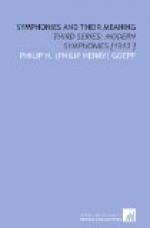[Footnote A: Some of the chance sayings of Mozart (recently edited by Kerst-Elberfeld) betray much contempt for academic study: “Learning from books is of no account. Here, here, and here (pointing to ear, head, and heart) is your school.” On the subject of librettists “with their professional tricks,” he says: “If we composers were equally faithful to our own rules (which were good enough when men knew no better), we should turn out just as poor a quality in our music as they in their librettos.” Yet, elsewhere, he admits: “No one has spent so much pains on the study of composition as myself. There is hardly a famous master in music whom I have not read through diligently and often.”]
The master feels the full worth of what has been achieved; else he has not mastered. He merely gives a crowning touch of poetic message, while the lighter mind is busy with tinkering of newer forms. For the highest reaches of an art, the poet must first have grasped all that has gone before. He will not rebel before he knows the spirit of the law, nor spend himself on novelty for its own sake.
The line between the Master and the Radical may often seem vague. For, the former has his Promethean strokes, all unpremeditated, compelled by the inner sequence,—as when Beethoven strikes the prophetic drum in the grim Scherzo of the Fifth Symphony; or in the Eroica when the horn sounds sheer ahead, out of line with the sustaining chorus; or when Bach leaps to his harmonic heights in organ fantasy and toccata; or Mozart sings his exquisite clashes in the G Minor Symphony.
As the true poet begins by absorption of the art that he finds, his early utterance will be imitative. His ultimate goal is not the strikingly new but the eternally true. It is a question less of men than of a point of view.
It seems sometimes that in art as in politics two parties are needed, one balancing the weaknesses of the other. As certain epochs are overburdened by the spirit of a past poet, so others are marred by the opposite excess, by a kind of neo-mania. The latter comes naturally as reaction from the former. Between them the poet holds the balance of clear vision.
When Peri overthrew the trammels of counterpoint, in a dream of Hellenic revival of drama, he could not hope to write a master-work. Destructive rebellion cannot be blended with constructive beauty. An antidote is of necessity not nourishment. Others may follow the path-breaker and slowly reclaim the best of old tradition from the new soil. The strange part of this rebellion is that it is always marked by the quality of stereotype which it seeks to avoid. This is an invariable symptom. It cannot be otherwise; for the rejection of existing art leaves too few resources. Moreover, the pioneer has his eye too exclusively upon the mere manner.




